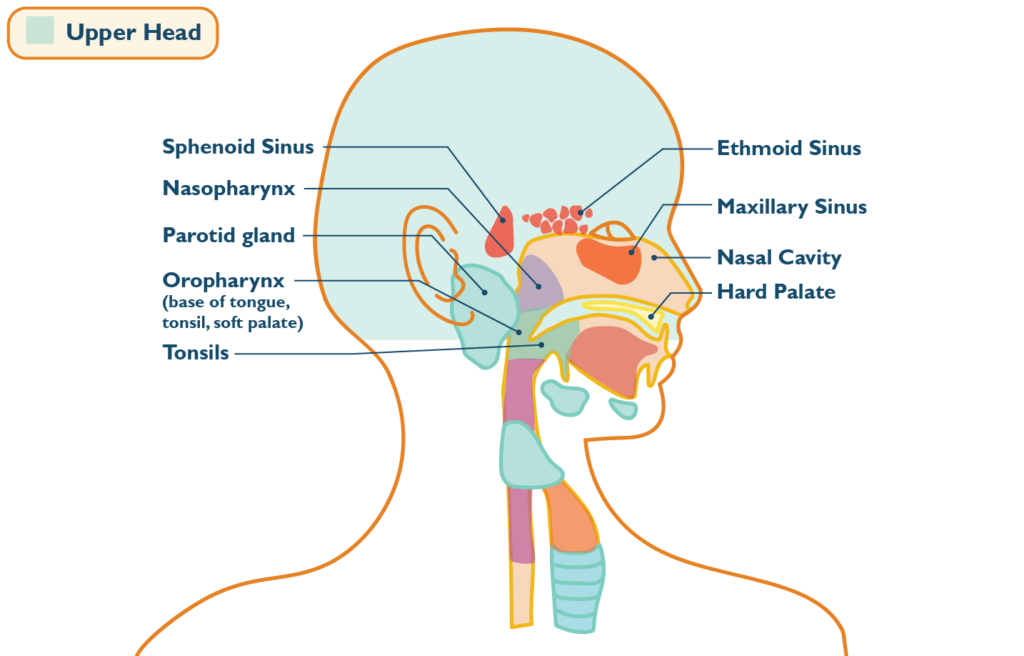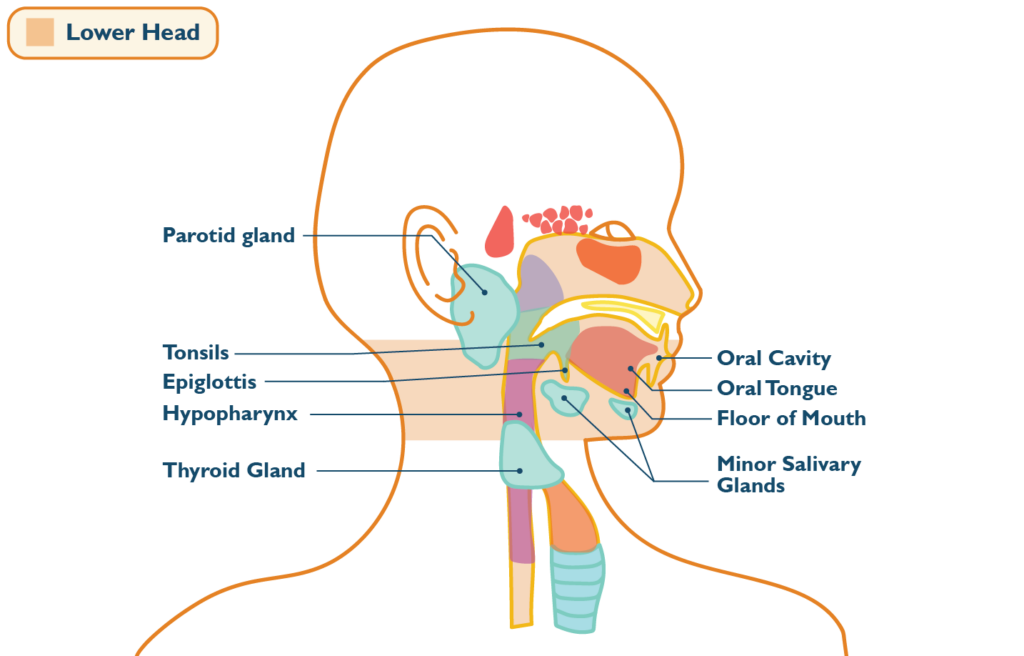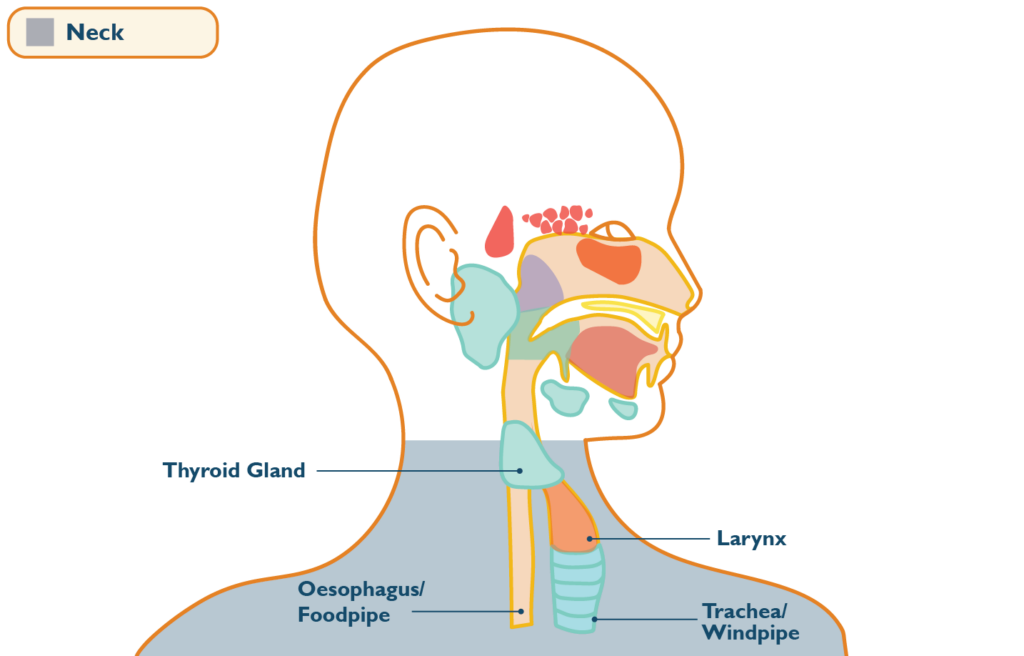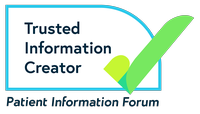Head and Neck cancer: Understanding side effects of radiotherapy
Radiotherapy for head and neck cancer can cause side effects. These can be life-changing for some people. They can vary depending on:
- Which areas are affected
- Other health conditions
- You as a unique patient (age, genetics, circumstances)
- Other cancer treatments you might have
There are delicate structures in the head and neck region, all close to each other, which makes side effects complicated and potentially life changing.
If you start to have new symptoms or pain, open sores or breathing problems it is very important to get medical advice quickly and rule out any further cancer.
The possible side effects listed here, and ideas to support you, have been split into these different sections:
- How likely am I to get side effects?
- Parts of the upper head, lower head and neck
- General effects for all parts of the head and neck
- Side effects when treating upper head region (nasopharynx, nasal cavity, sinuses, parotid gland, hard palate, oropharynx (base of tongue, tonsil, soft palate))
- Side effects when treating lower head region (oral cavity, hypopharynx, oral tongue, epiglottis, tonsils, parotid gland, salivary glands, floor of mouth)
- Side effects when treating neck region (larynx, trachea (windpipe), oesophagus (food pipe), thyroid gland)
- What can help with side effects
It is common to have treatment that overlaps more than one of the three main areas mentioned- upper head, lower head and neck.
Side effects can happen during treatment, soon after, or a long time after treatment has finished.
You might have side effects or symptoms not listed here, because everyone is different. They may also be caused by a different part of your cancer treatment. Research and support for side effects and late effects of radiotherapy is ongoing.
Joining a support group (see further information) can be a positive way to share your experiences, feel less alone, and come to terms with the physical and emotional impact of treatment. Ask your treatment or clinical team if you need more support or have any side effects at all.
Members of our patient engagement group tell us that the side effects from treatment for head and neck cancer can be very difficult to cope with. They all recommend getting to know others that have been through similar treatment and understand what this is like.
This page looks at early side effects.
How likely am I to get early side effects?
Before treatment you will discuss and sign a consent form with your clinical oncologist or therapeutic radiographer. They will tell you what to expect, and you can ask questions and discuss any concerns you have about late effects. It’s important to know what you are consenting to and can help to take someone with you.
You can read different radiotherapy consent forms (HERE) based on the specific area being treated. These consent forms are packed with useful information about early and late side effects.(1)
When you consent to treatment, you are agreeing that you have a chance of getting early and late side effects. Your team will use words like Expected, Common, Less Common and Rare.
This table shows what these words mean.
| Wording on the consent form | % chance of side or late effect | How many patients will get this? |
| Expected | 50 to 100% | Between half and all patients |
| Common | 10 to 50% | Up to half of all patients |
| Less common | Less than 10% | Fewer than one in ten patients |
| Rare | Less than 1% | Fewer than one in 100 patients |
Parts of the upper head, lower head and neck
Knowing the different areas of the head and neck can help with understanding the side effects listed below.
The upper head: This area contains the sphenoid, ethmoid and maxillary sinuses, the parotid gland, oropharynx (which includes the base of tongue and soft palette), the nasal cavity and hard palette.

The lower head: This includes the tonsils, epiglottis, hypopharynx, oral cavity, oral tongue, the floor of mouth and the salivary glands.

The neck: The neck includes the thyroid gland, larynx and both food and windpipes.

Early side effects (during or soon after treatment)
Early (sometimes called acute) side effects happen during and soon after radiotherapy.
General effects for all parts of the head
- Feeling very tired or fatigued: You might feel very tired during and after your treatment. It’s important to get plenty of rest but sometimes you will still feel really tired, even with lots of sleep. Some tiredness can be caused by having cancer and having cancer treatment, and some can be caused by travelling to and from hospital every day for treatment.
- Skin reactions: You might notice a change in colour, swelling, itching, or changes in the texture of your skin where you’re treated. For people with lighter skin tones these changes can be pink, red or darker than the surrounding area. People with brown and black skin tones might have colour changes such as maroon, purple, yellow or grey pigment changes. Or the skin can look darker than the surrounding area. These changes usually improve after treatment, but this can take 4 to 6 weeks in some cases.
- Hair loss: Hair loss can happen in the area you are treated. Some hair loss might be permanent. You can consider wearing a wig or hat if you feel self-conscious about hair loss. However, it is becoming more common for people to accept hair loss and choose not to cover it, as hats and wigs can be uncomfortable or too hot. For people who are able to grow a beard, it is advised to avoid wet shaving during treatment and only dry shaving with an electric shaver.
- Anxiety: Low mood and feeling down is very common and expected. It can help to talk to other patients and support groups who understand what you are going through.
- Pain and soreness: Radiotherapy can cause pain and soreness in the area being treated. It can make your mouth and throat sore, and painful, making it hard to swallow. Inside the mouth can look red for people with lighter skin tones but for people with brown and black skin the area can also sometimes have a purple tinge. It is common to get ulcers, thrush and infections in your mouth. This usually starts a few weeks into your treatment. It might be tough to eat because swallowing can be difficult. You can get support from a specialist pain management team ask your treatment team if pain becomes an issue for you. Be very honest with your team. Don’t leave asking for pain relief until it is too painful
- Dry mouth and thick mucus: Radiotherapy affects the glands that make saliva, leading to a dry mouth or thick mucus. Sometimes a nebulizer can help relieve thick mucous; this is a machine that will help break the mucous down. A dry mouth might be temporary or permanent. Keep your mouth moist by drinking water and using salt water Some patients say they find saliva pastilles helpful. However, your mouth might be too sore for saliva pastilles during treatment. As your mouth heals, these can be very helpful.
- Changes in taste and appetite: Food and drink might taste different. For example, sweet things can taste salty or metallic. Talk to a specialist dietician for tips on dealing with taste changes. It may be really difficult to keep a good appetite due to all the side effects and your mouth and throat being so sore. This is when you may need a feeding tube or build-up drinks. These challenges can last a long time or be permanent.
- Weight loss: It can be difficult to eat and maintain a balanced diet.
- Feeling or being sick: This is a common side effect as taste and sensation in the mouth changes. Food and drink won’t taste the same.
- Chest infection: You might need medication if you get a chest infection.
- Speech and language issues: Speech and language therapists can help support you. Not only with speaking, but with swallowing and other related issues. It is important to get a referral and receive the right support as soon as possible. There are voice and speech phone Apps available that can be helpful. Previous patients have suggested the Project Relate voice App or Speech Assistant. Both are free on android phones but have a price on iPhones. These Apps can help with communication when it’s difficult to talk.
Side effects when treating the upper head
- Ear problems: Swelling in the eustachian tube (which connects the middle ear to the back of the nose) can cause ear pain or a blocked sensation. Talk to your treatment team if you have ear discomfort or experience temporary hearing loss.
- Red or watery eyes. You may have dry eyes if your sinus area is being treated, or near the treatment area.
- Nose irritation: The lining of your nose can become irritated and feel blocked.
- Loss of smell: This is a common side effect.
Side effects when treating the lower head
- Cough: Irritation in the throat and upper part of the windpipe can cause a cough.
- Voice changes (hoarseness): Your voice might become hoarse if the voice box gets irritated and swollen from the treatment. Rest your voice and let your treatment team know if it becomes a problem.
Side effects when treating the neck
- Breathing difficulty: Radiotherapy can cause inflammation and swelling in the neck area, leading to breathing problems. In rare cases, this swelling can cause noisy breathing. If you have trouble breathing, seek medical help straight away.
- Cough: Irritation in the throat and upper part of the windpipe can cause a cough.
- Voice changes (hoarseness): Your voice might become hoarse if the voice box gets irritated and swollen from treatment. Rest your voice and let your treatment team know if it becomes a problem.
What can help with these early side effects?
- Preparation: Don’t wait for the pain to become too much. Ask for medication or a referral to the pain management team. A dietitian can help you find ways to keep eating well. Ask your treatment team about mouthwashes and saliva products that can help. You may be encouraged to have a feeding tube fitted before starting radiotherapy. This can help you receive nutrients and help maintain your weight. If you lose weight and change shape your radiotherapy mask will not fit, and a new mask and treatment plan may be needed.
- Rest and care: Take breaks, get plenty of sleep, and be kind to yourself during treatment.
- Drinking fluids: Drinking plenty of fluids such as water, juice and squash can help with fatigue and tiredness caused by your treatment. It can also help flush out toxins in your body caused by treatment. You can try diluted juice if you don’t like water.
- Skin care: Your treatment team can suggest creams to soothe your skin. Sometimes, extra care is needed if the skin breaks down in the treatment area. Wear loose clothing and stay out of the sun.
- Get help: It is really important to access support early from dietitians, pain management team, physiotherapists, speech and language teams and other specialists. Managing early symptoms like eating problems, swallowing and stiffness is vital to long-term recovery.
- Stay in touch: Always communicate with your treatment team about any side effects or concerns. They are there to help you feel better and support you throughout your treatment.
- Seek support: Speak to other patients and find support groups who understand what you are going through, they can help support you.
- Keeping active: Sometimes gentle movement can help you feel better, both during and after treatment. Your treatment team can tell you what is safe for you to do.
- Alcohol use: Please follow the NHS guidelines on safe drinking levels and any instructions you get from your team on what is right for you, your diagnosis and your treatment. If in doubt, please ask your team.
- Sexual changes: Talk to your team if you are experiencing issues with sex and cancer and they can offer advice.
- Stop smoking: If you are looking to stop or reduce smoking, there are services available to help you.
Further information
Facebook support groups:
Lifeafterlary UK.🇬🇧 laryngeal cancer | Facebook
Mouth Cancer Foundation Support Group | Facebook
Head and neck cancer – post radiation | Facebook
Head and Neck Cancer – UK Support Group | Facebook
Head and Neck Cancer Support Group UK | Facebook
Head and neck cancer | Macmillan Cancer Support
Further support:
Mouth Cancer Foundation – Support, Education & Research
Macmillan Cancer Support | The UK’s leading cancer care charity
Mouth Cancer Foundation | Helpline: 01924 950 950
The Swallows Head & Neck Cancer Support Group
Oracle Head and Neck Cancer UK – UK’s leading charity in head and neck cancer
Learn more about radiotherapy consent forms (HERE).

